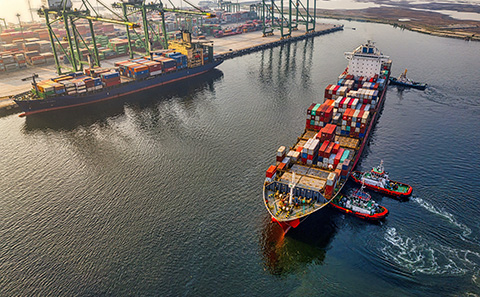Public support hydrogen and biofuels to decarbonise global shipping

New research into public attitudes towards alternative shipping fuels shows public backing for biofuel and hydrogen.
The study involving the University of Southampton also found that nuclear was preferred to the heavy fuel oil (HFO) currently used in the global shipping industry, although both were perceived negatively. Ammonia had the least public support.
Global shipping is responsible for 80 to 90 per cent of the world trade and accounts for around 3 per cent of global greenhouse gas (GHG) emissions. In 2021, 230 industry leaders pledged to achieve net-zero GHG emissions by 2050.
The new study published in Environment, Development and Sustainability is the first to test public attitudes to various fuels that could play a crucial role in decarbonising the global shipping industry.
“Switching to fuels with the potential to reduce GHG emissions on the scale needed to address the climate crisis has huge implications for the shipping industry,” says co-author of the paper Professor Damon Teagle, Director of the Southampton Marine and Maritime Institute at the University of Southampton.
“Due to the substantial investment and new infrastructure required, industry stakeholders are wary of going down the wrong path. It’s crucial that policymakers and industry leaders consult with the public and ensure their voices are heard when planning for this transition.”
The researchers conducted in-depth interviews and a survey of nearly a thousand people in the UK to explore public perceptions and support alternative shipping fuels.
Biofuel and Hydrogen were regarded the most favourably. Biofuel was viewed as low risk, while people felt hydrogen had low negative by-products.
Liquid natural gas (LNG) had middling support and didn’t elicit a strong public reaction, with the strongest association being around its current availability.
Nuclear was viewed more positively than HFO but it was still perceived negatively overall as people felt it was risky. As one interviewee put it, “If there was an oil spill, it’s terrible. But if there’s a nuclear spill it’s a freaking disaster.”
Although some techno-economic assessments have proposed that ammonia is the most-balanced carbon-free fuel alternative for shipping, the UK’s public perception was strongly negative. Ammonia was perceived as unproven and risky, and described as “dangerous” and “toxic” in interviews.
Interestingly, people living in port cities were slightly more supportive of using alternative shipping fuels overall.
“Our research shows there is public support for the research, development and implementation of alternative shipping fuels over incumbent fossil fuels, with biofuel and hydrogen preferred solutions,” says lead author Daniel Carlisle from Massey University in New Zealand. “LNG also seems likely to be regarded as a positive transitional solution.”
“Of course, public opinion is neither uniform nor static. But the disparity between public attitudes toward ammonia and that of scientists and industry leaders shows that public concerns need to be considered alongside technological and economic evaluations.”
Public response to decarbonisation through alternative shipping fuels is published in Environment, Development and Sustainability and is available online.